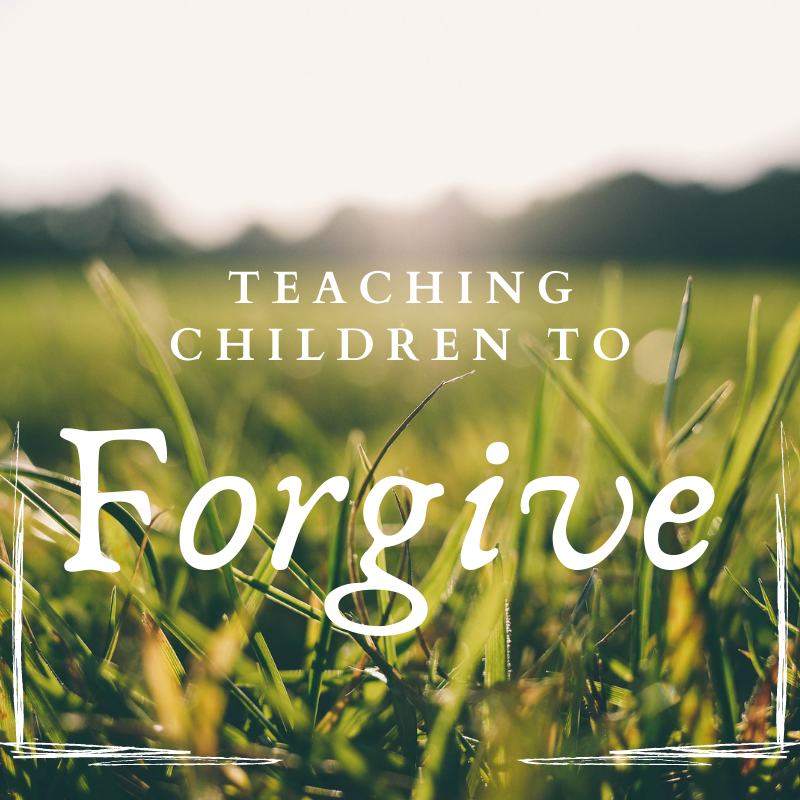
Let’s face it, adults have a hard time forgiving and in theory we have the ability to utilize rational thought. So how do you empower children to forgive when they are prone to be emotional and egocentric?
Like most worthwhile things in life, it takes time and effort. A critical aspect of teaching children to forgive is to be intentional on approaching the subject. Model a forgiving spirit towards them and others. Focus on them as a person and help them to do the same to others. If at first, they are not getting it, don’t force it, allow them to internalize the practice. Finally, teach them it is for their benefit just as much as it is for those around them.
Let’s jump in and explore the topic of character building in general and then specifically the subject of how to teach children to forgive.
For an in depth look at true forgiveness and it’s importance according to the Bible, check out this post, “Important Examples of Biblical Forgiveness”
Intentionality Is Key to Building Character
Have you ever considered how much time is placed on intentionally teaching children random facts about the world, history, and other subjects? Think about it. We don’t blink an eye about children spending many hundreds of hours and years studying history. We actually expect them to have spent years of their life cultivating science facts and even practicing scientific experiments. Similarly the expectation is that math skills begin before even going to preschool and culminates some 13 or 14 years later with high school graduation. Then there’s college…
How much time is intentionally devoted to teaching character traits? No really, I’m not talking about the nice kindergarten teacher who enforces the rule that everyone must say please and thank you. I’m talking about real character traits. How is it that entire semesters can be focused on a single subject but virtues and character can be totally ignored?
I’ll play devil’s advocate for a moment and say, perhaps it’s not the responsibility of the school system to teach virtue. I don’t necessarily believe that, but for the sake of argument let’s assume it is true. Who then is responsible for teaching it?
You are!
Wait! Before you panic, or turn away frustrated because you don’t need one more burden on your shoulders, read just a little further. Take a moment to consider the real implications here. Just because teaching character is important and falls into your realm, does not mean that it has to be complicated and rigid.
Find out more about For A Family Perspective and why we care about families.
1. Start By Modeling Forgiveness
Model forgiveness to your children. That means you have to be intentional with it. That means we as adults have to be continually developing our own character. If you are not actively modeling character development then you are essentially propagating the old “do as I say, not as I do” type parenting.
The Center for Parenting Education outlines that what you do and how you behave as an adult tends to be the biggest influence on how your children act. So teach your children to forgive by letting them see you ask for forgiveness.
Take a moment right now and think of something you should ask forgiveness for. Perhaps an unkind word. Or a hurried remark. Or distracted moment where you ignored or marginalized you child. Surely you can think of something, if not please leave a comment below so we can learn character building from you!
Now, once you are done reading this post, go and ask forgiveness for that action. Your child may not even remember it so you may have to remind them. Ask them how they felt and then, make the plunge and ask them to forgive you. Then, intentionally do this each time you do something that does not measure up to your own standard of character. If you do this consistently, your children will follow your lead, or it will at least make for easier conversations as you walk the walk…
2. Keep Everything in Context
Help children understand that seeking forgiveness does not excuse the wrongdoing. Furthermore, it may not eliminate the consequence. But forgiveness is still needed. If it is a minor thing then don’t make it into a big deal, however, at the same time do not make it into a smaller deal either. Create a family culture that acknowledges wrongdoing for what it is.
Do not inflate or deflate the situation too much either direction. It is important for a child to learn that actions and words have meaning and consequence to the individual who is hurt or wronged. So, if you want to teach them the meaning of true forgiveness you have to make sure they understand the seriousness of the action or words. As a parent you may have to provide that context for them.

3. Focus on the Person and Help Them Move Beyond the Situation
Let’s face it. It is easy to focus on the situation at hand. I remember times where my children fought over small things like old shirts, one not wanting to share with the other even though they had outgrown the item. I found myself angry at the seemingly calloused materialism (so I thought) of the situation, that in my parenting brilliance of the moment I lost my temper and threatened to throw it away.
After a berating lecture on selfishness and pettiness, I finally took a breath to let my daughter speak and she said she was sorry. Then through tears she expressed she didn’t so much care about the shirt as much about the fact that she wasn’t ready for her sister to grow up. Then expressed that she wasn’t ready to grow up either.
Even Parents Need to Work on Character Development…
What a sobering moment! Here I was, the one focused on the situation, and totally out of touch with deeper issues below the surface. I was given the opportunity to put step 1 (above) into practice…and step 2…
The next time you find yourself in a situation where forgiveness is in order, remind yourself that the person is the focus, not the situation.
There is no soul inside the broken lamp, or unshared bike, however, there is a soul inside the people involved in the situation. Even as grown-ups, with grown-up disputes this is important to remember.
Teach your children early to focus on the other person and minimize the situation. Do this by asking them if they have ever felt hurt or frustrated. Let them express their feelings and then encourage them to see the situation from the other persons viewpoint. Finally ask them how they would feel if they where in a similar situation and someone loved and forgave them regardless of what they had done. It may not work the first time, or every time, but it will work eventually.
4. Don’t Force the Situation
There will be times when a child will flat out refuse to offer forgiveness. Or perhaps even more dangerous, offer a form of insincere forgiveness. I would say it is more important that a child understand forgiveness rather than go through the motions of something disingenuousness.
So let the situation cool off a little and then revisit it. Remember you don’t want to make an offense less than it is so just casually bring it up later in the evening or the next day. Once they have had a chance to process it without the emotion, it may be easier to help them to put it into context and understand it. Plus it may give you the chance to see what other unresolved issues need to be addresses. Remember, intentionality is key! So, make a point to have frequent conversations.
5. Practice Proactive Teaching
Being intentional about teaching character only takes a few minutes here and there, but it is best to not wait until a situation has developed and blown up. Talk about it before hand. In the 60 seconds it takes for everyone to unbuckle and get out of the car before visiting the playground or a friend just run through a quick lesson.
“Hey guys, what is the golden rule?”
“What are you going to do if you accidently hurt someone or their feelings today?”
“I want you to keep your eyes open and see if you can find someone practicing forgiveness today. Then we can talk about it during dinner.”
Intentional. Simple. Lasting.
6. Leverage Examples from Others
Everyday we see character, or the lack there of, all around us. As you become more intentional in building character, you will naturally see opportunities to capitalize on learning opportunities. An easy place to start is talking about the good and bad behavior seen in others. But also take a moment to talk through scenes from movies or shows. In today’s world of being able to pause anything, anytime, take advantage of technology and just stop and talk about it right then.
You can do the same with books. We have recently been reading the Little House series at night and we see places where we can talk about character flaws and strengths. We were just reading about little Rose (Laura Ingalls daughter) and how she accidently got her friend in trouble. For a good portion of the book their friendship was nearly non-existent or hostile due to a lack of forgiveness. Don’t let these golden opportunities pass you by.
Character is Not Made Overnight
Building good character is a life-long endeavor. As parents we control the critical years so don’t waste the opportunities to mold a foundation that will last.
The first thing to remember is, when it comes to forgiveness, be intentional. Don’t wait for them to figure it out on their own.
Step through the process with them. Illustrate character by modeling a forgiving spirit yourself.
Help them to keep it in context by you doing the same. Furthermore, be genuine, don’t allow offenses to be swept under the rug.
In particular, help your children to focus on the person and not the situation. Treat others as they want to be treated. Don’t force them to say things they don’t mean, but do keep talking about it until they understand the significance.
Take the time to be proactive. Coach them before an event happens.
Finally, leverage other people and their experiences along with movies and books to help guide discussions on what is wrong and right.
It will take time, but it is worth the time. Character will last a lifetime!











0 Comments